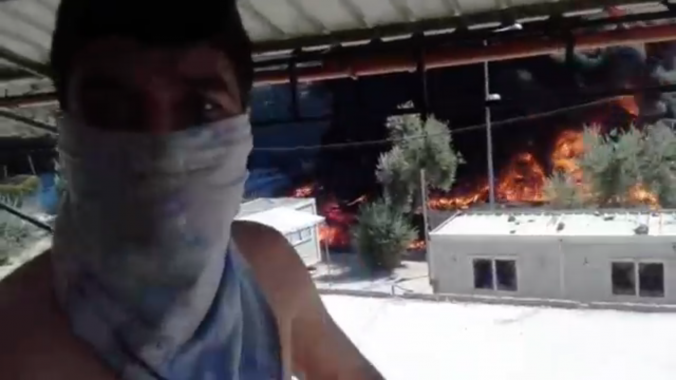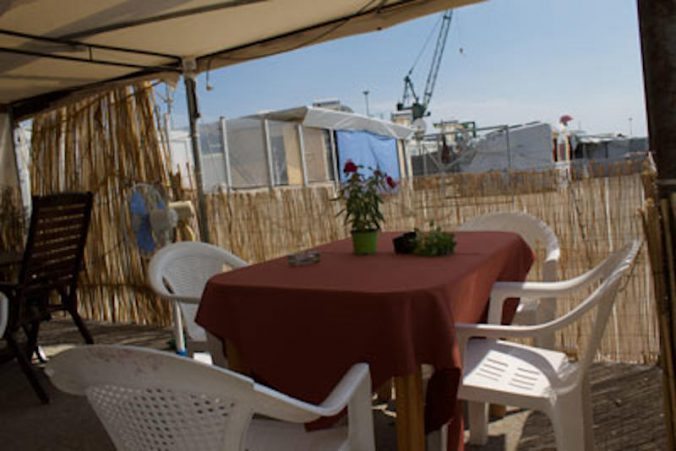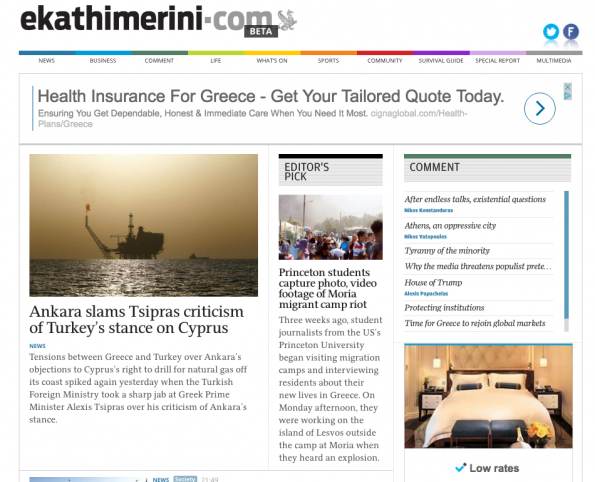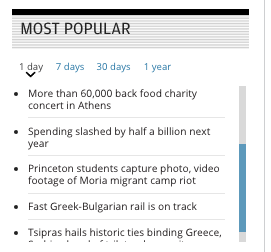Details can be found on the Kathimerini website, news partner with The New York Times:
Reporting on the front lines of history in Greece
Details can be found on the Kathimerini website, news partner with The New York Times:
On July 10, migrants living in a camp near the town of Moria on the Greek island of Lesbos demonstrated against their deteriorating living conditions. Then things got out of hand. Our video team was there.

By Talya Nevins
MORIA, Greece— A riot and fire today tore through the Moria migrant camp on the Greek island of Lesbos. Moria camp is the primary reception center for refugees who land on the Greek island of Lesbos, just five miles from the Turkish coast.
Princeton University journalists who were working outside the camp Monday afternoon heard explosions. Migrants could be seen in the distance hurling stones at metal housing containers, and a column of black smoke billowed about 15 stories high, blocking the sun.
Videos and photos taken by migrants inside the camp, and obtained exclusively by the journalists on the scene, showed several structures were gutted. At least two persons were seen collapsing just outside the camp and were treated.
One migrant explained that tensions erupted between a group of migrants and the non-governmental organization Euro Relief. Others claimed that the riots were in line with previous disturbances at the camp, in which migrants protested against the dismal conditions and stagnant registration process. During interviews in the days preceding the event, camp residents complained about overcrowding, inedible food and violence within the camp.
“They burned the camp because (authorities) don’t want to let people go,” Dandeen Matoko, a Congolese migrant who has lived in Moria for eight months, said in an interview while the disturbance continued on Monday. “They are keeping people here, we are not sleeping nicely, we are sleeping on the floor, other people are sleeping without covering themselves.
“They don’t give medication,” Matoko said. “Nothing at all. People are suffering. They are giving us dry rice. No meat, no soup. How can you survive? Back there it’s so difficult that we can’t really stand it. So people are so tired of this place, they don’t want to live.”
At one point, a squad of uniformed men bearing clear riot shields walked into the camp in formation. Fire trucks approached the gates of the camp, which is circled by coiled razor wire, but did not enter. One migrant collapsed outside the camp gate and others splashed her face with water. A man groaned on the ground before being carried away down a two-lane access road.
The camp houses more than 3,000 refugees, far beyond the capacity it was built to hold. There were no official reports of casualties in the incident.
Princeton journalists Alice Maiden, Jack Lohmann, Ethan Sterenfeld, Chiara Ficarelli and Andie Ayala contributed to this report. Video captured by Lohmann was published by permission by The Daily Mail of London, and can be viewed at http://www.dailymail.co.uk/video/news/video-1498615/Live-footage-shows-fire-Moria-refugee-camp-Lesbos-Greece.html
Look for more exclusive video soon at Reuters News and on the website of Greece’s most distinguished newspaper, Kathimerini, a news partner with The New York Times. Still images captured by our reporting team are available at http://commons.princeton.edu/globalreporting2017/scenes-from-moria-riot/
Raw video taken inside Moria camp by Ehsan Mansuri, an Iranian migrant and resident of Moria. Video obtained by Talya Nevins
By Chiara Ficarelli
SKARAMAGAS, Greece — Marwan Al-Ajam likes to fish.
On this Friday, the sea lapping on the dock at the Skaramagas migrant camp is giving.
Al-Ajam’s green bucket is filled with more than a dozen fish. Tonight he will feast.
“The little ones are very delicious,” Al-Ajam said, referring to the silver fish, which are no longer than his index finger. “I fry them quickly with spices.”
The 59-year-old has been following this routine for the past four months, ever since authorities resettled his family in Germany without him. Mornings begin with black coffee, a hunk of bread and a handful of dried dates. By 9 a.m. Al-Ajam is down at the dock with his rod, bait, and bucket. At 6 p.m. he heads home. Fish or no fish.
Al-Ajam spent a year living in Skaramagas with his 25-year-old son, Mohammad; his 28-year-old daughter, Noor; and her son. Since his family left, he lives alone in an apartment in the Athens neighborhood of Omonia, provided to him by the U.N. refugee agency. His wife died in Syria.
On the Greek island of Lesbos, thousands of migrants live in Moria migrant camp. Many migrants who arrived seeking international protection as refugees have been stuck on Lesbos for months, or even years. In July, tensions were rising quickly – until one day, they boiled. Aired on WPRB radio, March 2018
https://www.stitcher.com/podcast/wprb-news-and-culture/e/53829254?autoplay=true
For migrants, language can be among their biggest challenges. If they don’t know where in the world they will end up, how can they know which language to master? And where do they begin? Glodie Makunda of The Congo teaches English to migrants on the Greek island of Lesbos. He strives to transform English from a hurdle into a path to self-expression. Podcast by Alice Crites.
Aired on WPRB radio, November 2017
https://soundcloud.com/wprb-princeton/news-and-culture-smiling-flowers#t=0:00

MYTILENE, Greece– Late last year, Mohamad Hassan Atye arrived on the Greek island of Lesbos confused, lost and unsure.
“I heard the name of Greece just when we arrived here,” said the 24-year-old native of Afghanistan. “The police catch us from the sea, and they show us … a paper. They say, ‘We are here from Greece, and we are not Turkey,’ and that was the first time I heard the name of Greece.”
Atye works as an interpreter at Mosaik, a community center that teaches new languages to migrants in Mytilene, the capital of Lesbos. Finding a job allowed him to rent an apartment, which he said was much better than living in one of the island’s refugee camps.
“The life is not easy in the camp,” Atye said on July 11. The day before, migrants had rioted and set fire to the trailer of an aid group in the Moria camp, five miles down the road from Mytilene. Atye lived in Moria before he found a job as a translator.
Atye and other migrants who have found work as translators for aid organizations represent a rare bright spot amid gloomy employment prospects for recently arrived migrants in Greece. Many migrants have struggled to integrate into Greek society, according to interviews with more than a dozen migrants, aid workers, and experts on migrant integration.
READ THE full article at The Nassau Weekly: http://nassauweekly.com/found-in-translation/

By Alice Maiden
Mustafa Balqes is a 26-year-old Syrian who opened a café in Skaramagas migrant camp in July. Surrounded by bamboo fences and stocked with new wooden tables, his café adds color to the stark camp. Pink flowers on the tables frame the view of the Aegean Sea.
He installed a foosball and pool table in one tent, and surround-sound speakers in the other. If you ignore the United Nations tarp, you might forget for a moment that you’re in a migrant camp.
The UN High Commission for Refugees (UNHCR) estimates that nearly 50,000 migrants are still in Greece, awaiting asylum interviews in which they will make their cases for staying in Europe. Many migrants have been in camps for more than a year and still have months to go before their asylum cases are processed. Isolated from tourists and locals, counting dwindling savings and unstructured days, many migrants remain without jobs and little way to productively fill their days. But a few lucky migrants have found work in camps—or even, like Balqes, have started their own businesses.
The set-up was a major investment: Balqes said the pool table cost about 1750 euros (about $2,070), the billiard balls were another 750 euros ($890), and the rest of it—matching wooden tables and chairs, tablecloths, the coffeemaker—were another 1,000 euros ($1,180). Charging one euro ($1.18) for a game of pool, and one euro for a cup of coffee, just breaking even seemed like a distant future.
Continue reading on World Press news site: http://www.worldpress.org/article.cfm/Isolated-in-Greek-camps-migrants-find-work
By Andie Ayala
In recent years, more than 1 million migrants have floated across the Aegean Sea from Turkey to Greece, landing on the island of Lesbos. Hundreds of their boats happened to wash ashore on a small tourist beach directly behind the Aphrodite Hotel.
The Aphrodite Hotel has 53 rooms, a pool, a taverna and a spa. The Vita family, which runs the hotel, was caught flat footed when the unexpected guests suddenly began arriving two years ago.
On some days, as many as eight boatloads of migrants arrived on the tiny spit of sand, according to Aphrodite Vati Mariola, for whom the hotel is named. Many came from Syria, Afghanistan and Iraq. Mothers, fathers and children traveling alone were fleeing war, persecution and economic instability.
The hotel didn’t receive government or charity support between April and August 2015, Mariola said. Hotel guests would help them attend to the needs of the migrants when they arrived, and clean up the leftover clothes and life jackets that were cast aside on the beach.
When European coast guard ships began patrolling the area, the migrants stopped arriving. But the impact on the hotel continues, Mariola said.
In 2015, before the crisis, 7,989 guests stayed at the hotel, she said. In 2006, at the height of the crisis, tourists stayed away and the number of guests plummeted to 2,911, a 64 percent drop.
Mariola explained that many other local shops, restaurants and hotels experienced a similar decline in business, because tourists were afraid of coming to the island. Now, they are trying to spread word they are still open for business.
“What we need,” Mariola said, “is for the true story to get out there — that things are organized, that things are beautiful, that businesses are ready like they always were in the past.”
Princeton Alumni Weekly magazine recently spoke with journalists Talya Nevins and Alice Maiden, and wove the lessons they shared about their work in Greece into a podcast.
By Andie Ayala and Chiara Ficarelli
MYTILENE, Greece –– As flames engulfed the Moria migrant camp last week, Iranian migrant Arash Hampay sat quietly a few miles away in the shade of a bus stop in the center of the quaint town of Mytilene.
Next to Hampay was a cardboard sign that read, “Hunger Strike for Freedom: Day 14. We came to Europe for protection, but Europe rejects people and puts us in jail. Refugees are not criminals.”
Friends called Hampay’s phone to offer regular updates on events unfolding at the inflamed camp. Hampay said he found no happiness in the destruction, vowing to continue his nonviolent, two-week-old protest. He sought the release from Moria of his brother, Amir.
Another activist on the square, Runbir Serkepkani, provided a rough translation of Hampay’s comments: “I have committed myself to reach . . . freedom of [my] brother and the others who are detained. And I am going to continue until they release them or I will die.”
To date, officials have been unmoved by the hunger strike.
Although more than 1 million migrants have passed through the island of Lesbos over the last two years, daily life continues at a leisurely pace. As Moria burned, university students smoked in rooftop bars, elderly couples greeted each other on the street and fishing boats docked on the harbor.
Migrants from the Middle East and Africa sat in cafés and roamed about among the other residents, but there was an important distinction: Officially, they were denied the right to leave for the mainland.
Mehdi Medo, a migrant from Morocco who sat with Hampay, said he had been living in Moria camp for longer than a year.
“You have two worlds here” on Lebos, Medo said. “Refugees who sit here waiting for I-don’t-know-what, and people partying at night,
“It’s a beautiful island, but for the refugees it is a prison.”
Footage by Chiara Ficarelli, Andie Ayala, Talya Rose Nevins. Produced by Chiara Ficarelli.
When migrants wash ashore on Greek islands such as Lesbos and Chios, they actually have taken only their first step toward a new life in Europe. After days or months, most board a commercial ferry for the Port of Piraeus in the Greek capital of Athens. This video shares the sights and sounds experienced by hundreds of thousands of refugees on their 10-hour journey to mainland Europe aboard a Blue Star Ferry.
Student reporting on the Moria refugee camp has been named an Editor’s Pick and ranked as Most Popular by Kathimerini, the Greek news partner of The New York Times


The McGraw Center for Teaching and Learning
328 Frist Campus Center, Princeton University, Princeton, NJ 08544
PH: 609-258-2575 | FX: 609-258-1433
mcgrawect@princeton.edu
A unit of the Office of the Dean of the College
© Copyright 2024 The Trustees of Princeton University